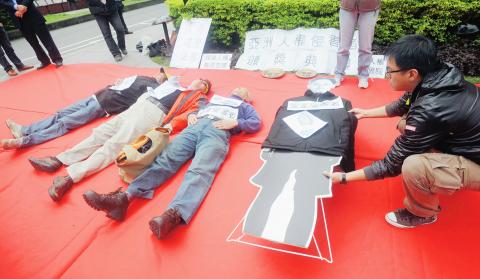A majority of Taiwanese are unhappy with President Ma Ying-jeou’s (馬英九) policies and how his administration has handled human rights development, public opinion polls released yesterday on International Human Rights Day showed.
Almost two in three respondents, or 62.3 percent, were not satisfied with his administration’s protection of human rights, with only 31.1 percent giving Ma positive reviews on the issue, Joseph Wu (吳釗燮), executive director of the DPP’s Policy Research Committee, told a press conference.
The survey was conducted on Thursday and Friday, and collected 1,170 valid samples with a margin of error of 3.06 percent, Wu said.

Photo: Lin Cheng-kung, Taipei Times
Public dissatisfaction with Ma’s performance in five areas on human rights — economic, environmental, judicial and political rights, as well as care for the disadvantaged — all exceeded 60 percent, with economic rights garnering a disapproval rate of 67.5 percent, followed by judicial protection with 67 percent, Wu said.
Another public survey released by Taiwan Indicator Survey Research (TISR) yesterday showed that a majority of respondents disapproved of most of the major policies that Ma had implemented this year.
The poll, touted as a year-end review of Ma’s policies, was conducted between Thursday and Friday, and collected 1,010 valid samples with a margin of error of 3.1 percent.
The TISR listed 10 major policies and asked respondents whether they supported them.
With the exception of Taiwan’s inclusion in the US’ Visa Waiver Program and a policy requiring the registration of real-estate transaction prices based on market value — both of which gained the support of more than half of those polled — the survey found that most of Ma’s policies were highly unpopular.
The increases in fuel and electricity rates were the most unpopular policy, with 87.8 percent of respondents voicing disapproval; followed by commodity price stabilization measures and pension reform, with 77.6 percent and 73.6 percent of respondents respectively saying the president handled the issues poorly.
Public dissatisfaction with the government’s handling of corruption investigations, US beef imports containing the feed additive ractopamine and the securities capital gains tax all came in above 60 percent, the survey found.
Even among respondents who identified themselves as Chinese Nationalist Party (KMT) supporters, the dissatisfaction rate surpassed 50 percent for five of the 10 policies.
The poll also showed Ma’s approval rating at 17.2 percent, while 73.5 percent of respondents disapproved of his performance. Only 24.6 percent found him credible.

ANOTHER EMERGES: The CWA yesterday said this year’s fourth storm of the typhoon season had formed in the South China Sea, but was not expected to affect Taiwan Tropical Storm Gaemi has intensified slightly as it heads toward Taiwan, where it is expected to affect the country in the coming days, the Central Weather Administration (CWA) said yesterday. As of 8am yesterday, the 120km-radius storm was 800km southeast of Oluanpi (鵝鑾鼻), Taiwan’s southernmost tip, moving at 9kph northwest, the agency said. A sea warning for Gaemi could be issued tonight at the earliest, it said, adding that the storm is projected to be closest to Taiwan on Wednesday or Thursday. Gaemi’s potential effect on Taiwan remains unclear, as that would depend on its direction, radius and intensity, forecasters said. Former Weather Forecast

As COVID-19 cases in Japan have been increasing for 10 consecutive weeks, people should get vaccinated before visiting the nation, the Centers for Disease Control (CDC) said. The centers reported 773 hospitalizations and 124 deaths related to COVID-19 in Taiwan last week. CDC Epidemic Intelligence Center Director Guo Hung-wei (郭宏偉) on Tuesday said the number of weekly COVID-19 cases reported in Japan has been increasing since mid-May and surpassed 55,000 cases from July 8 to July 14. The average number of COVID-19 patients at Japan’s healthcare facilities that week was also 1.39 times that of the week before and KP.3 is the dominant

The Chinese Communist Party’s (CCP) working group for Taiwan-related policies is likely to be upgraded to a committee-level body, a report commissioned by the Mainland Affairs Council (MAC) said. As Chinese President Xi Jinping (習近平) is increasingly likely to upgrade the CCP’s Central Leading Group for Taiwan Affairs, Taiwanese authorities should prepare by researching Xi and the CCP, the report said. At the third plenary session of the 20th Central Committee of the CCP, which ended on Thursday last week, the party set a target of 2029 for the completion of some tasks, meaning that Xi is likely preparing to

US-CHINA TRADE DISPUTE: Despite Beijing’s offer of preferential treatment, the lure of China has dimmed as Taiwanese and international investors move out Japan and the US have become the favored destinations for Taiwanese graduates as China’s attraction has waned over the years, the Ministry of Labor said. According to the ministry’s latest income and employment advisory published this month, 3,215 Taiwanese university graduates from the class of 2020 went to Japan, surpassing for the first time the 2,881 graduates who went to China. A total of 2,300 graduates from the class of 2021 went to the US, compared with the 2,262 who went to China, the document showed. The trend continued for the class of 2023, of whom 1,460 went to Japan, 1,334 went to